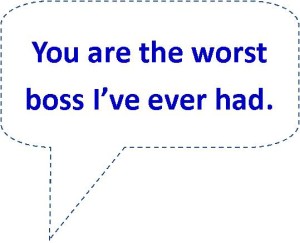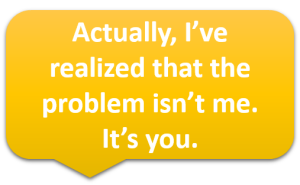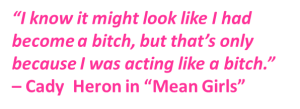Tag: work environment
How to Avoid Losing Your Shit at Work
 Have you ever lost your temper at work and could not rein it in? You know, the kind resulting in a red-faced tantrum, a shout-down, or a crazed look in your eyes that made it seem like you might actually throw things?
Have you ever lost your temper at work and could not rein it in? You know, the kind resulting in a red-faced tantrum, a shout-down, or a crazed look in your eyes that made it seem like you might actually throw things?
If not, we probably haven’t met. And you make me nervous. You either have supremely fine-tuned skills in finding healthy ways to vent your anger or you have an internal build-up of rage that will shatter windows if it ever explodes.
Losing your cool at work sounds bad, but there are so many provocations that it is normal to feel that way sometimes. Provocations like jerky managers, coworkers, staff or customers. Or equipment that breaks when you really need to use it, or having to deal with the technology support department. Some companies call the IT support function the “help desk”. Employees often call it the “unhelpful desk”.
The last time I unleashed on someone at work, that someone was the third person I’d spoken with about a common computer issue – I needed my password reset. I had been off and on the phone for two hours trying to get this resolved. I got more and more upset as the last support person I spoke with gave me incorrect information, asked questions I’d already answered for him, and sounded like he was enjoying my frustration. I finally asked for the hours and locations where I could get help in-person. He said he didn’t know. And then asked if he could close the support ticket.
I don’t remember exactly what I said, but I do remember holding my phone in front of me as I yelled into it.
Stories of people losing their tempers tend to stick around and become humorous because we relate to them. My family has one that goes back to the days when my mom had a Baskin Robbins store. One day a young man came in asking for a sample of an ice cream flavor. As she handed him the little spoon, he tried to give it back and said “It’s not big enough.” If you’ve ever worked long food service shifts for years on end, you’ll understand that her reaction was: “Get out. Get OUT. GET OUT!”
I try to treat people with respect even when I’m flustered or when they are behaving poorly because that is part of my values. However, I’m flawed and sometimes exceed my capacity for containing my feelings. Fortunately I’ve learned from others and from my own mistakes and now have a set of tactics in place to deal with potential blow-ups before they happen.
The first and best action to take when you feel like you’re about to explode is to leave. As in, leave the workplace until you’ve calmed down or just go home for the rest of the day.
This didn’t occur to me as option until a time when I was debriefing with my then-manager after a horrible meeting. It was a stressful place to work on a good day and after this particular meeting I was very upset. My manager said if I couldn’t clear my head enough to get through the day without the risk of snapping at someone in our department, then I should go home. He wasn’t annoyed – he was as miserable as I was but was better at hiding it.
I was stunned. I had never left work unless I was sick or had an appointment. It took a while for the logic to sink in. And once it did, I got my things and left and no one else noticed or cared. I was back the next morning with a refreshed perspective and ability to cope.
If you are in a less flexible environment where you need permission from managers to leave, take some time to get composed before you speak with them. Take deep breaths, splash water on your face, walk around a bit…then tell them you don’t feel well and need to leave.
Important: saying “I don’t feel well” is not a lie. If you are frustrated to the point where you might scream at the next person that takes too long getting coffee in the kitchen, then clearly you don’t feel well. It is in everyone’s best interest for you to recognize that and remove yourself from the potential triggers.
If leaving the workplace is out of the question, then get to the most private place you can, as soon as you can and for as long as you can. For most people this is the restroom. Even the most uptight workplaces have to let their employees go to the bathroom once in a while.
Lock yourself in a stall. This time you might not want to take deep breaths (!) but there are other ways to calm down enough to return to work.
Getting upset creates tunnel vision.
Gaining clarity about what is happening to us can broaden our perspectives, and in turn, give us more capacity to make choices about our actions. One technique I practiced in Seattle University’s Emotional Intelligence class is to name the feeling. To keep it simple, we learned to make a fist and label each knuckle as one of four feelings: mad, glad, sad or afraid (pronounce it “afrahd” because rhyming makes it easy to remember and also it is more fun to say that way).
For example, you might think, “I am mad because Janet cancelled my trip to the conference. I am sad because I think Janet didn’t understand why the conference is important to me and my project. I am afraid my coworkers will think I’m less important because I’m the only person on the team who won’t be at the conference.”
While you are thinking each statement, tap the knuckle that corresponds to the feeling you’re describing. I don’t pretend to know the physiological reason for it, but adding the physical action while you are thinking about your emotions helps to focus your attention and let your words sink in. If you can fully BE with the thought and feeling of “I am afraid my coworkers will think I’m less important”, you acknowledge, validate and process what you are experiencing.
You will probably feel vulnerable – but only to yourself in the moment, and once you acknowledge how you honestly feel, the emotions will move through you more quickly. You are turning your attention away from thoughts that keep you in a mental tailspin, like “Janet is wrong, she’s a jerk, this job is stupid and nobody stands up for me” and are putting your focus on taking care of yourself.
If you stay with this technique until you’re grounded again – or at least until you have to leave the restroom – you will be much more capable of getting through the rest of the workday without losing your shit.
Cuz you left your shit in the bathroom.
Sorry! Couldn’t resist that one.
Remember, reaching the limits of containing anger and frustration at work is normal. Recognizing it and taking actions to protect your reputation and avoid lashing out is professional and mature.
And hey! Wash your hands.
How to Survive a Horrible Boss
 Unfortunately, most of us will report to a boss that we hate at least once in our working lives. If it is just once, consider yourself lucky. I have a friend who has reported to five complete jerks and only two normal people in 15 years. It has been so tough on her that whenever she leaves one jerk behind to take a new role, I’m scared that the new boss will turn out to be just as jerky as the last.
Unfortunately, most of us will report to a boss that we hate at least once in our working lives. If it is just once, consider yourself lucky. I have a friend who has reported to five complete jerks and only two normal people in 15 years. It has been so tough on her that whenever she leaves one jerk behind to take a new role, I’m scared that the new boss will turn out to be just as jerky as the last.
A horrible boss can take many forms. She might yell at you or humiliate you. He might take credit for your work and blame you for his mistakes. She could try to sabotage your career out of spite. He could constantly change the direction of your projects, favor your teammates while disparaging you to others, threaten to fire you, or otherwise bully or harass you. Do any of these characteristics remind you of someone you’ve reported to?
The good news is that if you are stuck with a lousy manager, there are coping mechanisms that you can use until you or the creep move on.
One: Make friends with your boss’s peers. This is a strategic maneuver. If your boss’s peer group respects and likes you, then your boss has more to lose by treating you poorly. For example, if you provide information, resources, or anything else of value to another team within your department and you do it well, that team will not want you to get fired or quit in frustration. Get to know the managers of these groups. Show interest in them. Ask how you can provide additional value.
If the people in these teams don’t provide positive feedback to your manager on their own and you have an ally you can trust, ask that person to send an email touting your contribution. If you are visible in the department as someone whom other teams respect and depend on, your manager may grudgingly treat you better.
Two: Make friends with your boss’s boss. As with your boss’s peer group, being visible to your boss’s boss is essential. This person must know your name and recognize you when he or she sees you. If your work culture supports “skip-level” meetings, take advantage of it. Find out what this person cares about, worries about and what the goals are for his or her area of responsibility. Then think of smart questions to ask that will be easy for that person to answer. Ask about factors that contributed to recent successes. Treat the person like a respected mentor – say that you want to excel in your role and ask how he or she achieved career growth.
When you pass your boss’s boss in the halls, say hello and add any personal comment that is appropriate. If he or she has only recently met you, start off with, “Hi Cheryl, it was great to meet you the other day. I’m Joe Smith on Roger’s team. Thanks for the advice on the XYZ.”
Be natural and genuine, not smarmy!
Then when it is time for your boss to get approval for who to gives promotions or bonuses to, or how individuals are rated in performance reviews, your odds of having a favorable outcome are significantly increased than if you are completely unknown.
Three: Document your work and email it to your boss. Figure out a schedule that is not obnoxiously often and not so far apart that it is forgettable. Maybe every Friday, or once every two weeks. Keep it short so you don’t waste time and so that it has a better chance of being read. Even if it isn’t read, it is a record of your performance that you can bring up in meetings with your manager. This exercise is to cover your ass, so make sure your boss can’t use the excuse that your emails got lost in her inbox.
A good format is to make the subject line “Joe Smith’s Project Update, October 2, 2015″, then make a bullet list of three to six in-progress or completed projects. Use as much hard data as you can to support results. Examples:
- Closed $128K in hardware sales last week, and am at 102% of my quarterly quota.
- Delivered the Safety Training to 56 client teams year-to-date. The pass-rate is 92% vs. the goal of 90%, and satisfaction survey results are 95% vs. the goal of 90%. Satisfaction is currently 10% higher than last year.
- Delivered the ABC parts to XYZ customer on October 1, 2015, four days ahead of the due date. Received a thank you email from XYZ’s purchasing manager, Jane Smith.
Four: Document your boss’s poor behavior towards you. In any crappy work situation, documentation is critical. Many public and private sector organizations require managers or the Human Resources department to create a paper trail of documentation before they fire an employee to cover their tracks in case of a complaint or lawsuit.
Turn the tables and create your own documentation about how your manager treats you. Think of it as insurance in case you need to use it to protect your reputation. Document dates, verbatim quotes, witnesses and how the action violated the employee handbook (if applicable).
Your record of events may protect you if the situation gets worse. If your boss violates company policy towards you, maybe she has done the same to other people. Someone may have raised complaints in the past. If you decide to speak up or find yourself defending your integrity, your notes are likely to impact the outcome.
If you are fired, you might be able to use the documentation to get unemployment benefits. I know people in multiple states who have done this!
Or, you might choose to never disclose your notes. If so, it wasn’t a wasted effort. The act of documenting your reality is cathartic and can prevent you from feeling like you are the crazy one. Bad managers often specialize in lowering employees’ self-esteem and making them feel like failures. Don’t let them have that power over you.
Five: Remember that your manager doesn’t own you. I deliberately avoided using the terminology for a manager as someone “you work for.” You actually work for the organization – your manager is just the person you report to. I don’t even like the word “boss”…because you are the boss of your life and that person is only charged with the responsibility to manage you as an employee.
Your work is one part of your life, not your whole life. Don’t let your manager “follow you home” and ruin your weekends. Make that person as insignificant in your life as possible by focusing on what you do have influence over (see numbers 1 – 4!).
If you are currently dealing with a horrible manager, I hope you will have a new manager soon! Refresh your resume and LinkedIn profile. Get testimonials about your performance if possible (see numbers 1 and 2!). Save copies of your achievements and kudo’s from coworkers or customers (see number 3!). Brush up on any important skills and stay on top of current trends and technologies in your field.
And until then, I hope these tactics help you survive.
Regaining Confidence After a Bad Work Experience
 Bad jobs can hurt our souls. Humans thrive on contributing to things larger than ourselves, being productive, positive interactions with others and recognition for our efforts. A job is much more than a means to pay the bills.
Bad jobs can hurt our souls. Humans thrive on contributing to things larger than ourselves, being productive, positive interactions with others and recognition for our efforts. A job is much more than a means to pay the bills.
When a rotten manager tells you your work isn’t good enough – or you’re not good enough, it wounds your spirit. When coworkers blame and shame you, it rips little holes in your psyche. Even if you know that you add value to your company and that you do good work, even if you think your managers and their minions are idiots — constant negative feedback is damaging.
Many people who I’ve spoken with about quitting their jobs told me they lost confidence in themselves because of bad work experiences. These are people who have grown their careers, earned advanced degrees, or led initiatives that made millions of dollars for their companies. Some of them have tough reputations, and aren’t especially sensitive to criticism. Yet the negativity they endured made them unsure of themselves.
If you haven’t experienced a job like this and you’re not close to someone who has, you might be thinking, “If they were such great workers, why did their managers treat them so poorly?” Well, that is the reality of many organizations – whether military, education, corporate, religious or any other field — there is dysfunction. Often a team needs a scapegoat to blame for poor results, or to use as a target to vent their own insecurity and anger. Sometimes it is the company culture. Sometimes it is just crazy-making.
Feeling insecure about your value as an employee is not a great state to be in when searching for a new job. Interviewers can smell fear, and if you’re questioning your abilities, you may settle for a job you don’t want or accept a lower salary than you deserve.
It took some people two or three years to regain their confidence and self-esteem after a terrible job, regardless of whether they were fired or quit on their own. Ugh. That is too long to let the jerks continue to have power over you. Fortunately, it doesn’t have to be this way. The people who bounced back quickly have this advice:
- Take back your power right now. Remind yourself as many times a day as you need to that this is your life. You get to choose whether you tell your coworkers “don’t talk to me like that” or quietly plot your exit while biting your tongue.
- You are more than your job. You are not your title, your company, or your salary. You are a whole person with many parts to your life. Know that your value as a human being is based on many things, but how your boss treats you is not one of them.
- You have skills and talents. When you feel low because you only hear what your manager thinks you are doing wrong, remember what you are good at. Write a list of your positive work traits if you need to. Take the Strength Finders test. Think of all you have accomplished in the past. When you’re scanning the job listings or updating your resume, this is the frame of mind to be in.
If you’ve left a horrible job or are currently in one, I hope you hold onto your self-worth and use what you’ve learned about the experience. You may come out on the other side with clearer boundaries, greater awareness of your strengths, and the confidence that comes from knowing that actually you are the boss of your own life.
Is Your Job Making You a Jerk?
Is Your Job Making You a Jerk? Here are a several signs of jerk behavior:
- Are you impatient with your coworkers and staff?
- Do you blurt out statements instead of thinking about how to phrase your communication in a way that will allow others to listen without getting defensive or hurt?
- Do you put a lot of effort into presenting yourself as if you are happier and calmer than you are?
- Do you frequently vent your frustration or complain to others?
If so, either you were already a jerk, or your job is not bringing out your best behavior. If you think that deep down you’re a nice person, or you used to be, there’s hope.
We’ve all heard the phrase “a toxic work environment.” Except instead of your bloodstream being poisoned by toxic chemicals in a non-OSHA approved factory, your soul is poisoned by absorbing too much negativity in the workplace. It might stem from a manager who rules by fear, or takes out his own fears on you. It might come from a team of colleagues who fill meeting rooms with hostility. Or there are office bullies and back-stabbers to contend with.
It might be that your official duties make no sense, you’re required to work so many hours that you’re constantly exhausted, or you’ve seen enough coworkers fired that you’re just waiting until the axe falls on you.
If you are surrounded by negativity you probably aren’t the friendly person everyone wants to eat lunch with in the cafeteria. It is draining to put effort into positive behavior when you are miserable at work. Over time, you lose your capacity to control it. You may be low on the scale that spans from “occasionally rude” to “a monster from hell”, but why be on the jerk scale at all if you can help it?
 On the other hand, if you are non-stop cheerful despite working in a terrible environment, that is…not normal. You’ve either attained enlightenment or are detached from reality. Better to acknowledge the truth and then take action to change it.
On the other hand, if you are non-stop cheerful despite working in a terrible environment, that is…not normal. You’ve either attained enlightenment or are detached from reality. Better to acknowledge the truth and then take action to change it.
So what is the solution?
Quit.
Think about it: if you actually worked in a factory full of toxic chemicals, wouldn’t the best way to avoid poisoning your body be to stop exposing yourself to the toxins?
If you aren’t ready or willing to quit immediately, you can do a few things to protect yourself in the meantime. First, make a plan to quit! Save money, update your resume, network – you know the basics. Having a plan reminds yourself that you are empowered to make choices for your own life and that you are on a path leading to a better job.
Next, go ahead and vent – but only to one or two trusted coworkers who see the work environment the same way you do. Being able to tell someone about the crazy business decision that your boss just made will make you feel better, but only if your coworker gets why it is crazy and validates your frustration. Having a friend in the workplace who you can speak openly to without repercussions helps burn off that negative energy. It can also keep you from complaining to the wrong people – the people who are not on your side.
Finally, consider Dale Carnegie’s 30 principles from his book “How to Win Friends and Influence People”. All of the principles are useful to become a friendlier person and a more effective worker. My personal favorite is number 12: “If you are wrong, admit it quickly and emphatically.” When your jerk behavior gets the best of you, immediately apologize to the person you offended. Apologies show that you’re human, humble, and trying your best.
If your job is making you a jerk, know that it doesn’t have to be that way. You deserve a better workplace and a better attitude. Take steps to detox the negativity from your system. And be nice.
Choose Your People
Seth Godin recently posted a blog asking business people to consider what kind of customers they want. He expanded that to include other people like backers, members, and vendors and had a list of adjectives ranging from loyal to litigious.
The same thinking can be applied to any relationship. Focusing on business:
- What kinds of coworkers do you want to collaborate with?
- What kind of manager do you want to take direction from – or what kind of employees do you want to delegate to?
- What kind of company leaders are you willing to align yourself with?
Listing adjectives is a great way to identify what is important to you about the people you will interact with in business. Work satisfaction isn’t just about the job responsibilities, salary, location and hours. Think of how happy you can feel when you have a positive connection with the people you engage with, and how miserable you can feel when your personalities, work styles or values clash.
I think Godin’s most important point is that you have some choice and influence over the type of people you work for and with. If your management makes unreasonable demands of you, can you assert your boundaries without being punished or fired? If not, that doesn’t sound like a great place to work. As an entrepreneur, if you value signed contracts defining your scope of work and payment terms but your customers balk, maybe those aren’t the right customers for you.
To an extent, people learn how to treat you based on how you interact with them. If you put up with bad behavior, you’re teaching the offenders it is ok to treat you that way. If you react calmly and with an open mind when someone brings a conflict to you, you teach them that they can bring difficult issues to you without fearing your reaction.
Who do you want to work with? And how are you teaching them to treat you?
People underestimate the importance of their work environments
Is it just me, or does anyone else find a picture of a person with their laptop and their feet in the sand disturbing? The glare from the sun, specks of sand getting on the keyboard, wind and bugs. And why not get your work done first and then go outside on the beach?
I’ve heard people say to knowledge workers, “you should be able to work anywhere.”
Sometimes this is said to employees who sit in ugly, gray cubicles with bad lighting and lots of noisy distractions. Or to temps and consultants who are asked to be productive in cramped vendor bays with six other workers and slivers of desk space, with chairs and desks that don’t adjust in height. One team that I worked with asked a vendor to do his work from a table squeezed in a narrow hallway until the fire marshal said he had to move.
It is true that you can take your laptop anywhere with a wireless connection and be able to send email, and work on documents, spreadsheets and PowerPoints. But there’s more to it than that.
I’ve met many consultants, writers and entrepreneurs who love to work out of coffee shops. Some of them hunker down in their favorite café, day after day, until they are so familiar with the staff and other regulars that they are almost like coworkers.
Other people I know – the writers especially – have a series of hangouts that they’ll visit throughout the day. They’ll write for a couple of hours at one spot, then move to the next.
For me, my home office is the best place for me to work. I constantly refer to the marked up printed pages of my manuscript on my bookshelf. The sticky notes that outline my chapters are in rows on my filing cabinet. Each time I make a change to the order or content of each chapter, I update the notes. Technically, these things are paper and I could move them from place to place. Psychologically they’re the structure of my book and I need them in order and easy to reach.
For my consulting work, I also have hard copies of files that I refer to frequently. I have headphones for conference calls, a smart card reader, backup drives and my printer/scanner. Plus, an ergonomic mouse, keyboard and footrest. Anyone who’s had carpal tunnel, tennis elbow or wrist injuries from overusing a regular keyboard and mouse will understand how non-trivial these things are. Non-trivial and not very portable.
Beyond the physical elements that make me productive in my own office, there is the benefit of a consistent routine. When I sit down at my desk, my brain knows it is time to get to work. It’s where I’m able to focus most consistently and repeatedly, day after day.
So while technically it is possible to work almost anywhere with a laptop and wireless connection, how effective is it? And more importantly, do you want to?



Recent Comments